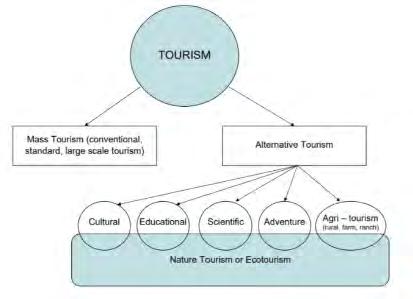
6 minute read
Is Ecotourism the Solution to Unsustainable Tourism?
by Christina Pellicio
I sit down and turn on my TV Research shows that tourism cause harm that is beginning to after a long day. Immediately, contributes to around 10% of have an unignorable effect on a travel commercial to Cancun global greenhouse gas emis- the state of the environment starts playing on the screen: sions, as well as a significant and local communities. Ecowithin 40 seconds, I am pre- portion of land, air, and wa- tourism is a growing alternasented with the image of a ter pollution. Through the tive travel solution that is often seemingly perfect life, one in overconsumption of natural directed towards threatened which I lounge in a comforting resources and improper de- natural environments and inwhite robe, surrounded by pris- velopment of infrastructure, tended as a low-impact altertine views of the crystal ocean considerable pressure is put on native to mainstream tourism. and swaying palm trees, piña Whether it is in colada in hand. the form of beThe speaker coming educated on the screen on environmenpromises me tal issues, providan all-inclusive ing funds for the 5-star resort for conservation of a relatively af- natural habitats, fordable price. or supporting the How could I say development of no? local communities, ecotourism However, as is emerging as a I continue to way to sustaingaze at the snip- ably support and pets of white Ecotourism encompasses the many forms of Alternative observe wildlife. sand beaches and luxury hotel Tourism. Retrieved from https://tourismnotes.com/ rooms, my blindness to the reeco-tourism/. Ecotourism originated in the ality of the commercial begins to fade. Such travel experiences like this, while surely enjoyable for the consumer, may not the local resources, resulting in the degradation and loss of vital natural ecosystems. 1970s but has risen in popularity in recent decades, largely as a mechanism to combat unsustainable practices that were be so ideal for the global community as a whole. In these ways, mass tourism can prevalent within the tourism industry. Mass tourism has
Advertisement
been known to have high envi- well as “design, construct and When executed properly, ecoronmental impacts, whether it operate low-impact facilities.” tourism can supply important be increasing carbon emissions economic benefits for developfrom plane travel or growing By practicing these “leave- ing nations. amounts of waste produced. no-trace” principles and regulating the size of ec- The last pillar of ecotourism, Due to masses of otourism groups, the socio-cultural pillar, seeks people often trav- ecotourists can to galvanize local support, adeling at once, “there exist leave a small- dress social issues, and preserve environmental effects of such movethree main pillars of sustainability er impact on the surroundthe culture of the destination. Social agencies and residents will ideally raise awareness and ment are needed for successful ing envi- act on social needs, nurture becoming increasingly difficult ecotourism: environmental, economic, and ronment while better imart, heritage, and culture, all of which enhances both the quality of life and quality of place to avoid. sociocultural.” mersing when done well. The UN Envi- themselves ronment Pro- into local life- When all three pillars of ecgramme explains styles. Further- otourism are implemented that tourism manage- more, by promoting properly, ecotourism can help ment plans in response to the the long-term benefits of con- mitigate the effects of unsusdegradation of destinations servation-minded practices, tainable tourism, provide muoften include implementing ecotourists hope that more de- tual benefits for tourists and land-altering objects, develop- structive interests will be given the locals, and aid tourists in ing the natural environments less priority. gaining a deeper appreciation further, and erasing the culture and connection to nature. of these places to make way for The economic pillar seeks to more tourist destinations. mitigate the economic “I think people in Amerleakage that mass ica are, maybe, losThe goal of ecotourism as a sustainable alternative is to minimize these effects of travel. An article by Dr. Adam Barnett titled “Sportfisheries, conservation and sustainable tourism often facilitates. Instead of tourism dollars being leaked ing a little bit of their connection with nature,” said Dr. Tiffany Rhodes, an “The goal of ecotourism is that we as ecotourism professionalso want to give people this meaningful, deep relationlivelihoods: a multidisciplinary out of the ecotourist ship with nature” that maybe guide to developing best prac- country they have never experienced who is a tice” states that there are three through before, so that they walk professionmain pillars of sustainability cruise away from that changed al member needed for successful ecotour- ships, hotel and wanting to save of the Interism: environmental, economic, hains, or other it.” national Ecoand sociocultural. non-local accom- tourism Society. modations, ecotour- “The goal of ecotourThe first pillar recognizes the ism advocates for local involve- ism is that we, as ecotourism impact that human activities ment in the tourism industry professionals, want to give peohave on the environment. Two to promote the reinvestment ple this meaningful, deep relaof the principles of ecotourism, of economic benefits into lo- tionship with nature that they as set by the International Ec- cal communities. This may be might have never experienced otourism Society, state that direct involvement such as ful- before, so that they walk away ecotourists should “minimize filling guide or mechanic roles, from that changed and wanting physical, social, behavioral, or indirectly by selling local to save it.” and psychological impacts,” as goods and tourist services.
Ecotourism group pictured with locals in Madagascar. Image provided by http://www.lambahoany.org/en/ecotourism-approach/sustainable-agriculture/.

Annual carbon dioxide emissions from international aviation in megatons of CO2 from 2005 to 2050. Retrieved from https://www.resilience.org/stories/2016-08-10/aviation-could-consume-a-quarter-of-1-5c-carbon-budgetby-2050/.

Rhodes thought back to some of her own experiences with ecotourism, explaining that they have helped her personally connect with nature, as well as build intimate relationships with locals. When detailing her recent trip to Zimbabwe, Rhodes stated that “we only stayed in local accommodations, ate at local restaurants, and had local guides.”
Other countries, such as Madagascar, also thrive on ecotourism, where ecotourism is allowed in small numbers because of the government’s strong commitment to conservation. Education and funds from the travel enable more conservation efforts for the country to implement in the future, and tourist revenue aids in stimulating the economy.
While ecotourism can have huge environmental, economic, and social benefits in cases like these, there are criticisms of the practice. One prominent critique is that ecotourists are still traveling by flight, which further contributes to our carbon emissions problem and creates a false image of the practice as being completely sustainable.
While this is true, Rhodes states that many ecotourists are actively fighting to change this by taking on an activist role.
“I think even though ecotourists have a big carbon footprint because of the plane use, they are the lobbyists to try to get it to be changed,” said Rhodes. “That’s the goal: to get every business and airline to start thinking about renewable energy and how to become more sustainable in their own practices. But they won’t do that unless consumers put the pressure on them.”
Another criticism is that ecotourism might pose a threat to indigenous cultures, further homogenizing the world through the introduction of non-local people and practices. Rhodes said, “I see ecotourism as trying to combat this homogeneity of the world, giving people reasons to have preservation of their local practices. I think tourism maybe has helped with the homogenization of the world, but I think it’s also probably the biggest avenue to stop it.”
Whether ecotourism can solve the issues associated with unsustainable travel is unknown. The emerging ecotourism model has much room for improvement. But if done right, ecotourism can have some benefits for both the environment and local communities. It can promote travel as a medium not only for personal enjoyment, but as a way to promote the health of local communities and the environment.
Full citations are available on the website.










